七年级英语下册全册导学案(仁爱英语)
仁爱英语七年级(下)全册导学案

Unit 5 Topic 1 Section A主备人:备课组长签字:编写时间:审核人:学习目标:1、知识与技能:A:学习并掌握本节课生词:gate---group . 通过预习达到会读、识记要求,上课时默写,要求在听写本上做好准备,标清序号(15个),条理清晰,每行4个,成绩计入个人周成绩表。
只要你肯下决心并付诸行动,你一定会赢在起跑线上的!B:学习频度副词:如usually(通常),你在P1 还能够找到两个,试一试:____________(经常);______________(总是)C:学习交通方式的表达法:骑自行车:by bike ;你来试一试:乘火车_______________乘飞机_______________乘地铁_______________乘轮船_______________乘小船_______________乘公交_______________乘小轿车_______________特别注意!:步行_______________ (可以参考课本P2)以上词组要求熟背,课堂上个人,小组进行竞赛展示,期望你是最棒的!更期望你是小组的骄傲!D:能够用一般现在时谈论交通方式,尝试翻译:How do you usually come to school ?____________________________?I usually come to school by bus . _______________________________康康总是怎样回家的?______________________________________?2、过程与方法课前做好预习,预习中做好预测,标出不会的内容,寻求同桌、小组帮忙,聆听别人的见解,专注于老师的总结。
3、情感态度价值观:(1)随着社会经济的发展,人们的生活水平和生活质量越来越高,各种交通工具开始进入人们的日常生活,我们要学会珍惜,学会感恩,更要学会创造!(2)交通安全时时刻刻要牢记!学习重点、难点:1、频度副词2、交通方式3、对交通方式的一般现在时谈论学习流程:【阅读质疑自主探究】1、默写下列单词:自行车_______ 公交车_______ 小轿车______ 火车______飞机______ _轮船________ 小船_______ 地铁_______ 脚_______2、写出下列动词的单三形式A. come _______ look_______ work_______ live _______B. guess_______ teach_______ dress_______ watch______ catch_______C. try _______study _______carry_______ fly _______D. go _______do _______have_______ be _______3、补全对话:A: Nice to see you again ! B: ________________________!A: Your new bike looks very new !B:___________________!A: Happy birthday !B:_________________!A: Happy New Year ! B:___________________!【多元互动合作探究】Read 1a . 理解并翻译下列词组或句子1.at the gate2.Happy New Year ! The same to you !3.look very nice .4.by bike by subway by bus5.How about ….? = _______________?6.It’s time for class !=___________________!7.It’s time _____ sth = It’s time ____ _____ sth .8.It’s time ____sb ____ sth . – It’s time ___ sb ___ ____ sth .【训练检测目标探究】(一)根据句意和首字母提示完成句子1. My mother o_______ goes to work by bus .2.They a_______ play games after school .3. They are brothers , they look the s________.4. It’s a long way , you must go there by t____________.(二) 单项选择题( )1.Happy New Year ! ________________! A.Thank you ! B. You are right ! C. The same to you ! D. Sorry ! ( )2. ___ do you usually have lunch ? At school . A. When B. Wher C. How D. Why ( )3. How are you going to the Summer Palace ? We are going there ____ bike .A. forB. atC. ofD. by( )4. _____ do you usually go to your office ? By bus . A. How often B. What time C. When D. How ( )5. It’s five o’clock . It’s _____ go home . A.time to B. time for C. time D. time to go to ( )6. Kangkang’s new shoes look _________. A. happy B. well C. nice D. the same( )7. ___________________ ? It’s half past six.A. What’s the o’clockB. What’s the time is.C. What time is itD. What’s the time is it( )8. Hi, Li Ming , your book is very interesting (有趣). _____________.A.Thank you .B. Don’t say so !C. That’s rightD. You are right( )9. I usually take the subway to school . __________? I usually go to school by bus .A. How are youB. How do youC. What do youD.How about you(三)对划线部分提问1. Jane usually goes to school by subway .2. They always go to work by bus.【迁移应用拓展探究】1.交通工具的表达法:by +______________.2.对交通工具的提问用:_____+_______________________________?3. 当节日属于大家共同拥有时,面对别人的祝贺我们应该说:_____________!4. 当节日属于你个人拥有时,面对别人的祝贺你应该说:_____________!学后反思:___________________________________________________________________________________________ __________________________________________________________________________________________Unit 5 Topic 1 Section B主备人:备课组长签字:编写时间:审核人:学习目标:1、知识与技能:A:学习并掌握本节课生词:weekday --- park要求:熟读、识记会默写,在听写本上做好准备,上课默写,再创一个辉煌100分!B:学习频度副词:通常经常总是有时很少从来都不C:学习交通方式的动词词组表达法:乘火车:take a train . 你来试一试:乘飞机______ 乘轮船_________乘小船________乘公交________乘小轿车___________★★★步行:walk ;骑自行车ride a /one’s bike ;乘地铁take the subway2、情感态度价值观:“黑发不知勤学早,白首方悔读书迟”,我们要惜时珍时,更要勤奋。
仁爱版七下导学案U6T1SB

课题:Unit 6Topic 1 Section B
课型:课时:总课时:
主备人:____________实施者:____________实施时间:______________
班级:______________姓名:____________所属小组:________编号:_______学习时间:________
— There is/are….
学
习
过
程
展示分组:(全班分6小组,全员展示)
1.单词乐园。
2.看视频,回答1b问题,朗读、翻译1a和表演。
3.1a语法讲解,课文改编对话。
4.1c,运用句型Is/Are there…..? What is in/on/behind/under….?编对话。
5.P30页,2,看图说话。
3、课文点拨
1a1、There isa lamp, a computer, some books and so on.
There be结构表示存在。其中be动词的单复数取决于离be最近的主语。
1、on the wall表示在墙的表面。in the wall在墙的内部
2、put away“把…收起来”,宾语代词放中间,宾语时名词,可放中间也可放末尾
—There are _____ new words in it. It’s too difficult for me.
A.littleB.fewC.so muchD.so many
2.根据句意,从方框中选择合适的单词,并用其适当形式填空。
chair, two, put, watch, be
1.—Where’s your study?
随
堂
测
最新仁爱版七年级英语下册全英文教案(全英文全册)

七耳怨英语下册全英夂教秦(全英夂全册)科厂英语Λ幅:七坪銀教师: ________________聲特科屮M嗾教学进度表姓名修或麻债亿录班级座位表最新仁爱版七年级英语下册全英文教案(全英文全册)1. Do 2a. StUdy the example to UnderStand the two WayS Of expressing means Of transportation. Then fill in the blanks in 2a. DiSCUSS and CheCk the answers ・2. Make the StUdentS find the rules Of two WayS Of expressing the Same meaning by themselves. HeIP them CheCk the rules.3. Do 2b. ASk and answer questions about the PiCtUreS in 2a , USing two WayS Of expressing means Of transportation. HeIP the StUdentS to express correctly.4. Do 3. Read the form in 3 before IiStening ・ PrediCt the IiStening material ・ Leam the new words: WatCh TV. SOCCer/football, movie/film. Then IiSten to the PaSSage about NanCy ,s activities and CheCk the COrreCt answers individually. Then CheCk the answersBlaCkbOard DeSignTOPiC 1 I USUany COme to SChOOl by subway. SeCtiOn B 1. IaIWaySgetIJPdtSiX (/clock ・ 2. The early bird CatCheS the WOrm ・3.I IISllaIIy COme to SChOOl On foot, but SOmetimeS by bike ・I SeldOm Walk to SChOOL I never COnIe to SChOOl by subway. 2. Li Xiang Often COmeS to SChOOl by bike ・Li Xiang Often rides a bike to school.never(()%) Sel(IOIn SOnletinIrS Often IISuaIIy always(100%)I 1—^1I —I ——~~Thinking after teaching:Step4 PraCtiCe (IOS)Homework:1 .Recite 10 WOrdS and finish WOrkbOOk ・ 2. P ι*actice the COnVerSatiOn Of la;3. Preview SeCtiOn C-la.StePl ReViSe (IOS)Step2 PreSentatiOn (IOS)Step3COnSOIidatiOn(IOS)Step4 PraCtiCe (IOS)1. H ave a diction.(IOwords)2. Help the StUdentS to revise the WOrdS about the days Of a Week and subjects.1. PreSent new WOrdS and new PattemS With the help Of the flashcardsand context.2. Do la. LOOk at the PiCtUre in la. PrediCt the IiStening material in la. Then IiSten to the tape and COmPlete the two COkImnS in the table in lb. Then IiSten again and COmPlete the third CoIUmn in lb. CheCk the answers.1. R ead Ia after the tape.2.r ∏ιen PraCtiCetlιeCOnVerSatiOn in Ia in PairS ・ 3. Do lb. L∞k at the table in lb. Try to Say the SentenCeS With the help Of the table.(让学生说完整的句子)1 .Create SitUatiOnS to PreSent the new phrase. CheCk the answers ・Make the StUdentS PraCtiCe the WOrdS Of SUbjeCtS orally.2. Ask and answer questions With your Partner With the PhraSeS in the box in 2a.3. Do 2b. Make the StUdentS PraCtiCe the expressions about IikeS and dislikes ・4. Work in PairS ・ LOOk at the PiCtUreS in 2b and make UP new conversations. PraCtiCe the COnVerSatiOnS in PairS ・5. D O 3.Make the StUdentS USe the expressions about IikeS and dislikes in Oral WOrk and Written WOrk after Iearning ・StePl ReViSe (IOS)Step2 PreSentatiOn (IOS)Step3 COnSOIidatiOn(IOS)Step4 PraCtiCe (IOS)l.Have a diction.(IOwords)2Revise the WOrdS about the days Of a Week and subjects. 3.Show SOme PhOtOS about sch∞l activities to arouse the StudentSqinterests.1. D o la. PreSent new WOrdS in the context. PrediCt the reading materialbefore reading ・2. L OOk at the PiCtUreS in la. Read the StatementS before reading the material. Try to guess TrUe Or FaISe before reading ・3. R ead the PaSSage in Ia individually. CirCle TnJe Or False. Then CheCk your answers With your Partner.Help the StUdentS CheCk their answers WhiIe reading ・1 .Try to SUmmariZe the main idea Of each ParagraPh.Help the StUdentS Iearn to USe their OWn WOrdS to SUnImariZe the main idea ・2.Do lb. Read Ia again and fill in the blanks in Ib individually. CheCk the answers ・1. Look at the news and POSterS in2. Try to guess the COntent in them. Then read the news and POSterS about HU Biιι,s interesting SChOOl Iife and fill iιι the blanks iιι the following table.2. Make the StUdentS Iearn to make POSterS and news by themselves ・3. Do 4a. Read the WOrdS in 4a individually. Then read the WOrdS to your partner.4. Do 4b. Read the WOrdS On PPT together, where, bear, there, chair, near, here ・ Read the Chant after the tape ・ Pay attention to the rhythm. Then PraCtiCe the Chant in PairS ・最新仁爱版七年级英语下册全英文教案(全英文全册)。
仁爱版英语七年级下册全册教案(详细)
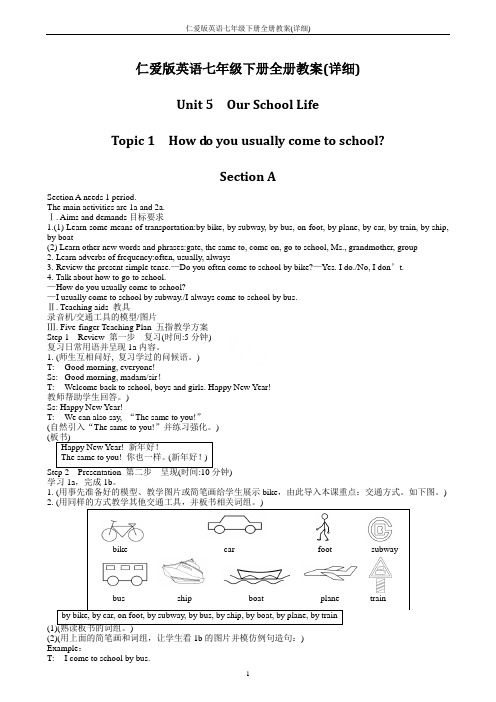
bike
car
foot
subway
bus
ship
boat
plane
train
by bike, by car, on foot, by subway, by bus, by ship, by boat, by plane, by train
(1)(熟读板书的词组。) (2)(用上面的简笔画和词组,让学生看 1b 的图片并模仿例句造句:) Example: T: I come to school by bus.
2
仁爱版英语七年级下册全册教案(详细)
3. (让学生听录音, 完成 2b。掌握生词 Ms.和 grandmother。) T: Next, we will have a listening practice. Let’s find out how people come to school or come to work. Do you
understand?
Ss: Yes, we do. (播放录音,并核对答案。) Step 5 Project 第五步 综合探究活动(时间:15 分钟) 用表达交通工具的名词和频度副词进行实践调查, 完成 3。 1. (使用多媒体课件、flash 动画或简笔画, 让学生展开想象, 任意造句子, 要求用上交通工具的表达用语和 频度副词。) T: Let’s look at the pictures. I’m sure you are interested in these lovely pictures. Please make sentences as you like, and don’t forget to use these means of transportation and adverbs of frequency. Are you ready? Go! 2. (让学生分组做一个关于 how to come to school 的调查报告并完成 3。调查时,强调用“How do you usually come to school?”和“I usually come to school…”句型,掌握生词 group。)
仁爱版七年级下册英语unit5topic3导学案

Unit 5 Topic 3 My school life is very interesting Section教学目标 Present Continuous words: physics geography art math history politics biology Mon day Tuesday Wedn esday Thursday Friday Saturday核心问题 What day is it today? It ' s Monday. What class is he having? He is having a math class. What time is it over? 拓展问题 They are learning a history class. 一、问题预设(1 )教师预设问题:(学生预习内容) En glish class. What time does it beg in ?... What time is it over? Lear n 1a2、 学生分组完成1b3、 Answer the questions in 2a.4、 Part 3 What do we do in a history class? Learn about the past.In a math class Work on math problemabout the past. What class are they having? They are having课程名称:语文数学英语 科学音乐美术写出下列短语:在周三上历史课结束每周二、问题呈现:1、教师创设情景,呈现问题。
What day is it today? Its Mon day.物理 政治 历史 生物 体育 课外活动 演算讨论中国地图What class are you hav ing? We are hav ing an 写出并熟记一周英语名称:Section B教学目标Words: easy difficult interesting boring which subjectSenten ces: Which subject do you like best? I like art best.Why do you like it? Because it ' s easy and interesting.What do you think of English? It ' s difficult and boring.核心问题I like English because it ' s easy and interesting. I don ' t like English because it ' s difficult and boring.拓展问题I like …because ….He doesn ' t like …because …一、问题预设一、完成下列句子:1. 我觉得英语既简单又有趣。
仁爱版英语七年级下册Unit7 Topic3导学案

仁爱版英语七年级下册Unit 7 Topic 3 Section A课文1a重点短语与句型:at the party在聚会上play the piano弹钢琴perform magic tricks玩魔术(play tricks on sb捉弄某人)enjoy oneself玩得开心1. -How was Kangkang's birthday party? 康康的生日聚会怎么样?-It was very nice.非常好。
2. -Did you sing a song at the party? 你在聚会上唱了歌吗?-Yes, I did.是的,我唱了。
3. -What did Sally do? 莎莉做了什么?-She danced.她跳了舞。
4. -Did Kangkang enjoy himself?康康玩得高兴吗?-Of course. He was happy. 当然。
他非常高兴。
【知识点拨】(oneself反身代词—myself—yourself—himself—herself—ourselves—yourselves—themselves)上周我们玩得很开心。
eg: He enjoys playing basketball. 他喜欢打篮球。
2. 一般过去时:表示过去某个时间发生的动作或存在的状态。
动词的过去式的形式: 1). be动词(was/ were)2). 实义动词的过去式(规则变化和不规则变化)变化规则: A. 一般在动词原形末尾加-ed. 如: play-playedB. 结尾不发音字母e结尾加-d. 如: live- livedC. 末尾只有一个辅音字母的重读闭音节词,双写末尾辅音字母,再加-ed. 如: stop- stoppedD. 结尾是辅音字母+y结尾的动词,改y为i,再加-ed. 如: study- studied时间状语: yesterday 昨天,last year 去年,in 2000在2000年,three days ago 三天前,just now 刚刚,in those days 在那些日子里句式变化:1). A. 肯定句: 主语+ was/were + 其他。
仁爱版英语七年级下册Unit7TheBirthdayParty全单元导学案附复习练习讲解
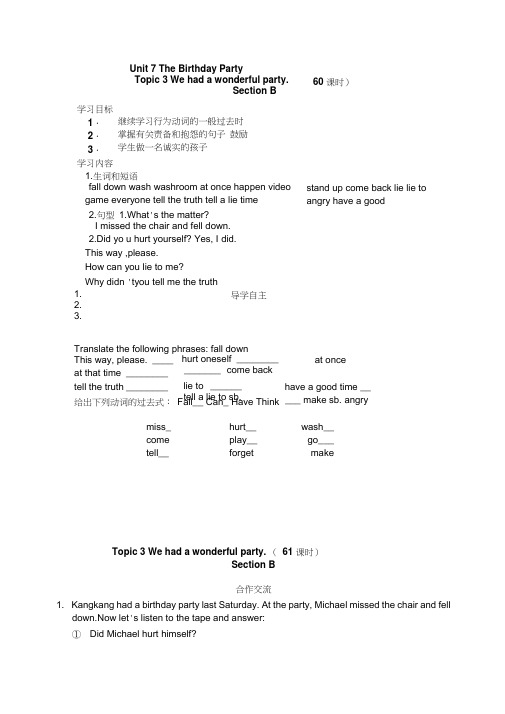
Topic 3 We had a wonderful party. ( 61 课时)Section B合作交流1. Kangkang had a birthday party last Saturday. At the party, Michael missed the chair and felldown.Now let 's listen to the tape and answer:① Did Michael hurt himself?Unit 7 The Birthday PartyTopic 3 We had a wonderful party.Section B60 课时)学习目标 1. 2. 3. 学习内容 继续学习行为动词的一般过去时 掌握有关责备和抱怨的句子 鼓励学生做一名诚实的孩子 1.生词和短语fall down wash washroom at once happen video game everyone tell the truth tell a lie time 2.句型 1.What 's the matter?I missed the chair and fell down. 2.Did yo u hurt yourself? Yes, I did. This way ,please.How can you lie to me?Why didn 'tyou tell me the truth 导学自主 stand up come back lie lie to angry have a good1. 2. 3. Translate the following phrases: fall down This way, please. ____ at that time ________ tell the truth ________ 给出下列动词的过去式: Fall__ Can_ Have Think hurt oneself ________ _______ come back lie to ______ tell a lie to sb. at once have a good time __ ___ make sb. angry miss_ come tell__ hurt__ play__ forget wash__ go___ make②Where did he want to go?2. Two students a group and act out 1a班级展示A、展示合作交流1B、展示合作交流23. 短文填空:At Kan gka ng ' birthday party, his frie nds played a game. Michael missed the chair and________ dow n. He couldntsta nd up. Did he hurt ______ ? No, he ______OK. Hishands got dirty. He had to wash them. He wan ted to go to the washroom. Kan gka ng____ him the way.C、Part 2 Listen and answe①Did Judy lie to her father?②Why did she come back late last night?质疑探究用所给动词的适当形式填空:1. Judy _____ (lie) to her father this mornin g. It ____ (make)her father very an gry.2. Michael ______ (fall)dow n but he ______ (not hurt) himself.3. Judy _____ (come) back late last ni ght. Her father ____ (th ink) she played video games.四、总结,生成新问题。
(完整)仁爱英语七年级下导学案Unit5Topic3导学案
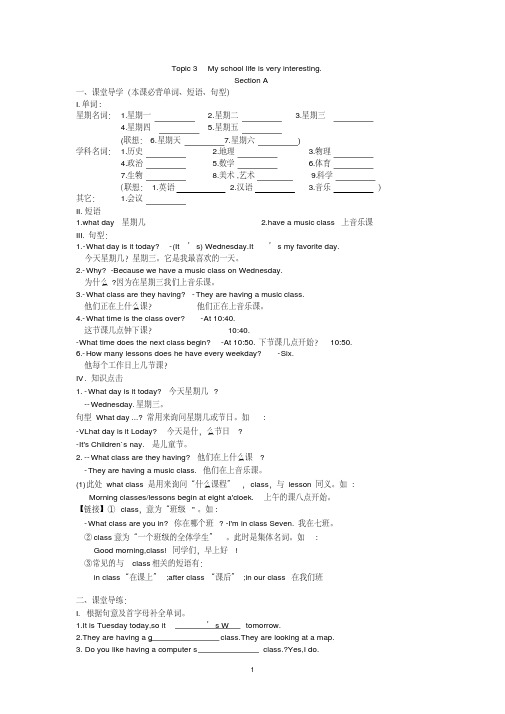
Topic 3 My school life is very interesting.Section A一、课堂导学(本课必背单词、短语、句型)I.单词:星期名词: 1.星期一 2.星期二 3.星期三4.星期四5.星期五(联想:6.星期天7.星期六)学科名词: 1.历史 2.地理 3.物理4.政治5.数学6.体育7.生物8.美术,艺术9.科学(联想:1.英语 2.汉语 3.音乐)其它: 1.会议II.短语1.what day 星期几2.have a music class 上音乐课III.句型:1.-What day is it today? -(It’s) Wednesday.It’s my favorite day.今天星期几?星期三。
它是我最喜欢的一天。
2.-Why? -Because we have a music class on Wednesday.为什么?因为在星期三我们上音乐课。
3.-What class are they having?-They are having a music class.他们正在上什么课?他们正在上音乐课。
4.-What time is the class over? -At 10:40.这节课几点钟下课?10:40.-What time does the next class begin? -At 10:50.下节课几点开始?10:50.6.-How many lessons does he have every weekday? -Six.他每个工作日上几节课?IV. 知识点击1. -What day is it today?今天星期几?--Wednesday.星期三。
句型What day ...?常用来询问星期几或节日。
如:-VLhat day is it Loday?今天是什,么节日?-It's Children`s nay.是儿童节。
仁爱英语七年级下册导学案全册
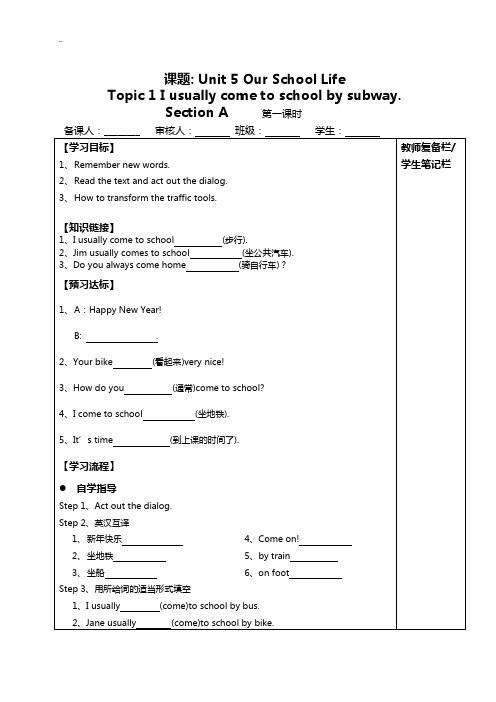
课题: Unit 5 Our School LifeTopic 1 I usually come to school by subway.Section A第一课时课题: Unit 5 Our School Life Topic 1 How do you usually come to school? Section B 第二课时课题: Unit 5 Our School LifeTopic 1 I usually come to school by subway.Section C第三课时课题: Unit 5 Our School LifeTopic 1 I usually come to school by subway.Section D第四课时Topic 2 A few students are running around theplayground .Section A(第一课时)4.would like to …5.play basketball _______________6.Good idea! __________________!7.See you soon !________________!我能再读1a,找出使用现在进行时态的句子并翻译,然后回答下列问题:1. Is Jane doing her homework ?2.What is Jane doing ?3.What is Michael doing ?4.How does Michael like “making cards”?5.Would they like to play basketball ?Step 2 我能读2a 并且和我的同伴练习对话,我能再读2a 完成2b.Step 3 我能看着1a和2a中的六幅图画和同伴自由编对话。
Step 4 我能根据4中的图画和例句编写对话展示在小黑板上。
Step 5 我能完成3并和同伴核对答案。
仁爱版七年级英语下册导学案:Unit 7 Topic 3 Section ABCTB 导学案
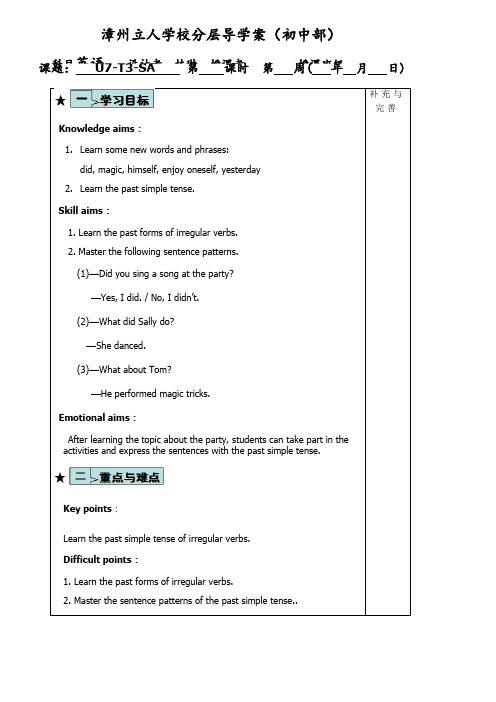
课题: U7-T3-SA 第 课时 第 周( 年 月 日) Knowledge aims :1. Learn some new words and phrases:did, magic, himself, enjoy oneself, yesterday2. Learn the past simple tense.Skill aims :1. Learn the past forms of irregular verbs.2. Master the following sentence patterns.(1)—Did you sing a song at the party?—Yes, I did. / No, I didn ’t.(2)—What did Sally do?—She danced.(3)—What about Tom?—He performed magic tricks.Emotional aims :After learning the topic about the party, students can take part in the activities and express the sentences with the past simple tense.Key points :Learn the past simple tense of irregular verbs.Difficult points :1. Learn the past forms of irregular verbs.2. Master the sentence patterns of the past simple tense.. 漳州立人学校分层导学案(初中部) 科目英语 设计者 林琳 授课者________ 授课班级________:分层导学、讲练结合: 1 课时Preview(设计意图:旨在引导学生自主预习)1.Learn the past simple tense.(学习行为动词的一般过去时态) 课本P121-122:1.概念:表示过去发生的动作或存在的状态。
仁爱科普版七年级英语下册导学案

仁爱科普版七年级英语下册导学案全文共3篇示例,供读者参考篇1Title: The Totally Awesome Grade 7 English Study BuddyHey hey, fellow students! Jessica here, your friendly neighborhood English study guide writer. I've been working hard to put together this extra fun, super helpful companion for mastering all the key concepts in our Grade 7 Volume 2 English textbook. Let's dive right in!Unit 1: Telling StoriesStorytelling is such a core part of human culture and communication. In this unit, we'll explore different story genres like fables, fairy tales, and personal narratives. You'll learn techniques for plot structure, character development, and setting vivid scenes. My top tips? Don't be afraid to let your imagination run wild when creative writing. And for narrative essays about real experiences, add lots of juicy, specific details to make it come alive!Unit 2: Let's DebateGet ready to argue like a pro! This unit covers the essentials of formal debate including making persuasive claims, building logical arguments, and dismantling the opposition's reasoning. One key skill is being able to look at an issue from multiple perspectives, so keep an open mind. You'll also learn about qualities of an effective public speaker like confidence, clarity, and engaging body language. My debate coach always says: "If you can sell a pen to a calligrapher, you've nailed it!"Unit 3: Our Diverse WorldIn an increasingly globalized society, it's so important to build cross-cultural understanding and celebrate diversity. This unit touches on traditions and customs from around the world related to food, festivals, clothing, and more. You'll learn lots of fascinating new vocabulary too! My favorite part was researching unique cultural celebrations -- I had no idea there was a festival dedicated entirely to tomatoes in Spain. How crazy is that?Unit 4: Nature's MarvelsGet ready to go green and appreciate the incredible world around us! We'll read all about amazing plants, animals, ecosystems, and natural phenomena. You'll learn technical terms related to biology, ecology, and earth science, but don't worry - I've included tons of examples and visuals to make it all click. Mytop nature marvel has to be the coconut crab - it's so massive that it can crack open coconuts with its pincers. I mean, come on! How cool is that?Unit 5: Health KicksTime to get that body and brain in tip-top shape! This unit covers nutrition, exercise, sleep, mental health, and overall wellness. You'll learn interesting facts about the science of how our bodies work, plus get advice for developing healthy daily habits. Did you know that laughing is a legit ab workout because it works your core muscles? Or that just 20 minutes oflow-intensity walking can boost your mood? I picked up so many neat health hacks while studying this unit.Unit 6: The Future Is NowTechnology is rapidly evolving and transforming the world we live in. This unit explores cutting-edge innovations across different fields like robotics, artificial intelligence, renewable energy, biotechnology, and more. You'll learn all the latest buzzwords and be able to discuss the potential impacts -- both positive and negative. One mind-blowing example is nanosensors that could travel in the bloodstream to detect health issues. Crazy futuristic stuff!Unit 7: Mysteries of the PastTime to go back in time and uncover some of history's most fascinating riddles! This unit covers topics like undeciphered codes, unexplained artifacts, ancient legends, and prehistoric mysteries. You'll learn how to evaluate sources, formulate theories, and make persuasive arguments just like a historian. My favorite unsolved case involves the Voynich manuscript - its weird writing has never been cracked after centuries of analysis. Makes you wonder what amazing secrets it could hold!Unit 8: Vacation InspirationAfter all your hard work this semester, it's time to put those English skills to use and start planning an epic summer adventure! You'll learn about researching destinations, understanding travel logistics and etiquette, communicating across languages, and more. I can't wait to share my dream vacation to Australia where we'd go scuba diving at the Great Barrier Reef, explore the Outback, and meet cute koalas. Sadly it'll have to stay a dream for now...but maybe one day!Well, that's it folks - the entire Grade 7 Vol. 2 English experience summed up in a fun, digestible way. I hope this study guide gets you totally excited to dive into all the awesome readings, activities, and projects coming your way. LearningEnglish is a journey, but I'll be here to help make it assmooth-sailing and enjoyable as possible. Let's rock this semester!篇2A Student's Guide to 7th Grade English (Second Semester)Hey there, fellow English learners! As we dive into the second half of our 7th grade journey, it's time to gear up and get ready to take our English skills to new heights. In this guide, I'll share some insider tips and tricks that have helped me navigate through the world of grammar, literature, and composition like a pro. Let's get started!Unit 1: The Wonderful World of GrammarAh, grammar – the foundation of any language. I know, I know, it can be a little dry at times, but trust me, mastering these rules will make you a language ninja! In this unit, we'll explore the intricacies of verb tenses, subject-verb agreement, and those pesky modifiers. My top tip? Practice, practice, practice! Incorporate these grammar concepts into your daily conversations and writing, and they'll become second nature.Unit 2: Reading Comprehension and Literary AnalysisGet ready to embark on a literary adventure! This unit is all about diving deep into various texts, from short stories to poems and novels. We'll learn how to analyze characters, themes, and literary devices like metaphors and symbolism. My secret weapon? Active reading! Don't just passively consume the words; engage with the text by taking notes, highlighting key passages, and asking yourself questions along the way.Unit 3: The Art of CompositionWriting is an art form, and this unit will teach you how to wield your pen (or keyboard) like a master. We'll cover different types of essays, such as persuasive, expository, and narrative, as well as the essential elements of a well-crafted piece, including a strong thesis statement, supporting evidence, and a compelling conclusion. My top tip? Show, don't tell! Use vivid descriptions, sensory details, and powerful language to paint a picture in your reader's mind.Unit 4: Public Speaking and PresentationsLet's face it, standing in front of a crowd can benerve-wracking. But fear not, my friends! This unit will equip you with the skills you need to conquer those public speaking jitters. We'll learn how to structure a compelling speech, use effective body language and vocal variety, and even incorporate visualaids like PowerPoint presentations. My secret weapon? Practice in front of a mirror篇3Title: The Inside Scoop - 7th Grade English Study Guide (Second Semester)What's up fellow 7th graders! I'm here to give you all the tips and tricks to absolutely crush the second half of our English textbook this year. Whether you're an English whiz or struggling to keep up, this study guide has got your back. Let's dive right in!Unit 1: Telling TalesYo, who doesn't love a good story? This unit is all about narratives and creative writing. You'll learn how to craft an engaging plot, develop characters that leap off the page, and describe settings so vividly you'll feel like you're actually there.Key Takeaways:Study the story elements like characters, setting, plot, conflict, and resolutionPractice "show, don't tell" by using vivid sensory detailsAnalyze example narratives to see how authors bring stories to lifeUnit 2: Poetic VoicesTime to get in touch with your inner poet! This unit explores different poetic forms like haikus, limericks, and free verse. You'll learn to interpret deeper meanings through figurative language and discover how to express your thoughts and feelings poetically.Key Takeaways:Identify poetic devices like imagery, metaphors, and rhyme schemesExperiment with different poetry styles and structuresAnalyze poems for tone, theme, and poet's purposeUnit 3: Persuasive PowersLit's get convincing! The persuasive writing and speaking skills you develop here will be invaluable. You'll learn how to construct logical arguments, address counterarguments, and appeal to your audience through ethos, pathos and logos.Key Takeaways:Study persuasive techniques like rhetorical questions and emotional appealsPractice drafting strong thesis statements and topic sentencesAnalyze advertisements and speeches to identify persuasive strategiesUnit 4: The Art of ArgumentSimilar to persuasive writing but a bit more formal, this unit dives into argumentative essays. You'll learn to gather evidence, acknowledge different perspectives, and develop clear claims backed by credible sources.Key Takeaways:Understand different argument structures like classical and RogerianPractice integrating quoted evidence and citing sourcesAnalyze example arguments to identify claims, evidence and reasoningUnit 5: Media SavvyIn this multi-media focused unit, you'll develop a critical eye for analyzing all sorts of texts from websites to public service announcements. Detecting purpose, bias, and intended audience will be major skills to master.Key Takeaways:Learn to identify facts vs. opinions and objective vs. subjective contentPractice interpreting messages conveyed through word choice and toneAnalyze how different media forms impact meaning and perceptionUnit 6: The Play's The ThingDrama, drama, drama! Get ready to study the elements of plays and live performances. You'll analyze characters' motivations, explore themes, and learn about different dramatic conventions used to capture the audience.Key Takeaways:Study stagecraft vocabulary like staging, props, and dramatic ironyPractice reading plays with expression during class readingsAnalyze a filmed play, looking at how production elements impact the storyUnit 7: Novel InsightsCoral, it's novel time! Over this unit you'll read a full-length novel as a class. You'll zoom in on analyzing the plot, exploring character development, and identifying the central themes presented.Key Takeaways:Learn strategies for tracking plot events and analyzing motifsPractice making inferences about characters based on evidenceAnalyze how the novel's setting impacts the story and character choicesUnit 8: Research ReinventedThe final unit is all about killing the research game. You'll learn crucial skills like formulating research questions, evaluating source credibility, avoiding plagiarism, and synthesizing information into a cohesive paper or presentation.Key Takeaways:Understand different research methods and source typesPractice note-taking and organizing information from sourcesAnalyze example research projects to see proper citations and formattingThat's a wrap! With these tips in your back pocket, you're ready to take on any reading, writing, or analysis tasks that come your way. Make sure to ask your teacher for clarification if you need it and do your best! You've got this.。
仁爱英语七年级下导学案
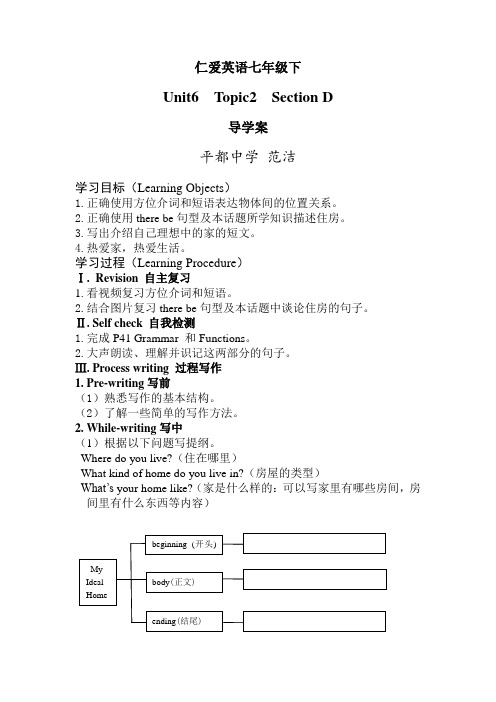
仁爱英语七年级下Unit6 Topic2 Section D导学案平都中学范洁学习目标(Learning Objects)1.正确使用方位介词和短语表达物体间的位置关系。
2.正确使用there be句型及本话题所学知识描述住房。
3.写出介绍自己理想中的家的短文。
4.热爱家,热爱生活。
学习过程(Learning Procedure)Ⅰ.Revision自主复习1.看视频复习方位介词和短语。
2.结合图片复习there be句型及本话题中谈论住房的句子。
Ⅱ.Self check 自我检测1.完成P41 Grammar和Functions。
2.大声朗读、理解并识记这两部分的句子。
Ⅲ. Process writing 过程写作1. Pre-writing写前(1)熟悉写作的基本结构。
(2)了解一些简单的写作方法。
2. While-writing写中(1)根据以下问题写提纲。
Where do you live?(住在哪里)What kind of home do you live in?(房屋的类型)What’s your home like?(家是什么样的:可以写家里有哪些房间,房间里有什么东西等内容)(2)画出自己理想中的家。
(3)根据图画完成短文。
注意:正确使用人称和时态,合理使用方位介词。
___________________________________________________________ ___________________________________________________________ ___________________________________________________________ ___________________________________________________________ ___________________________________________________________ ___________________________________________________________ ______________________________________________________________________________________________________________________ 3. Post-writing写后小组内互评,用红笔改出文中的错误,并选出小组中最好的一篇。
导学案 (仁爱版英语七年级)
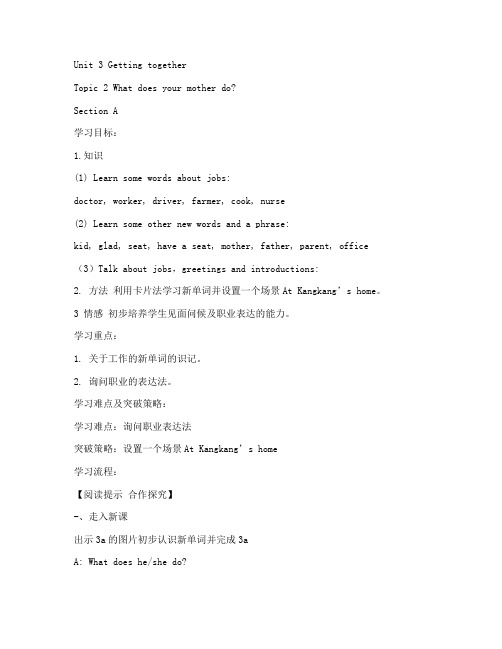
Unit 3 Getting togetherTopic 2 What does your mother do?Section A学习目标:1.知识(1) Learn some words about jobs:doctor, worker, driver, farmer, cook, nurse(2) Learn some other new words and a phrase:kid, glad, seat, have a seat, mother, father, parent, office (3)Talk about jobs,greetings and introductions:2. 方法利用卡片法学习新单词并设置一个场景At Kangkang’s home。
3 情感初步培养学生见面问候及职业表达的能力。
学习重点:1. 关于工作的新单词的识记。
2. 询问职业的表达法。
学习难点及突破策略:学习难点:询问职业表达法突破策略:设置一个场景At Kangkang’s home学习流程:【阅读提示合作探究】-、走入新课出示3a的图片初步认识新单词并完成3aA: What does he/she do?B: He/She is …..二、阅读提示1:1. 找出下列单词及词组。
doctor, worker, driver, farmer, cook, nurse , kid, glad, seat, have a seat, mother, father, parent, office2. 找出你不懂的其它短语及词汇。
____________________________________________________________-_____________________________________________________________三、阅读提示2:1. 阅读对话1a和 2a并翻译下列词组(1). 见到你很高兴( 2 ).就坐(3).这是我的妈妈(4).你妈妈是做什么的呢?( 5)我的父母亲都是白领____________________________________________________________-_____________________________________________________________2. 阅读对话1a和 2a并回答下列问题。
七下U7T3导学案(仁爱版英语七年级)

七下U7T3导学案(仁爱版英语七年级)Unit 7 Topic 3 导学案Section A一、单词。
1. 有魔力的2. 把戏;诡计3. 享受;欣赏4. 他自己5. 功夫6. adv. 在昨天 n. 昨天二、短语和句子。
1. 过得愉快2. 表演一些魔术3. 康康的生日聚会怎么样?很好。
4. 你弹钢琴了吗?不,我没有。
但是Maria弹了。
5. Jane在聚会上做什么了?她跳舞了。
课堂检测:一. 单项选择。
( ) 1. -Mary, tomorrow is my birthday. Can you come to my birthday party?-_____ My mother is ill. I must look after her at home.A. Yes, I can.B.I can’t come.C. Why not?D. Sorry, I’m afraid not.( ) 2.-Tom, did yo u enjoy _____ at Kangkang’s birthday party yesterday? -Yes, I did.A. youselfB. yourselfC. yourselvesD. himself()3. -What did Ben do at the party? -He _______ Chinese kung fu.A. performsB. dancedC. didD. performs( ) 4. -What _____ Jenny _____ on Saturday? -She drew pictures.A. does; doB. did; doC. did; didD. did; draw( ) 5. -Did you sing songs or play the guitar at the party? -_________.A. Yes, I like playing the guitar.B. No, I didn’t sing any songs .C. I sang a Chinese song.D. I didn’t play the guitar.二、用所给词的适当形式填空。
仁爱版英语七年级下册全册教案(详细)

仁爱版英语七年级下册全册教案(详细)
S1: I come to school by bike. S2: I go to school on foot. (完成 1b,板书 go to school。)
go to school (3)(询问两名学生上学所使用的交通方式, 用 usually, always 和 often 作替换练习, 并示范汇报结果。) T: I often come to school by bike. Do you often come to school by bike? S3: Yes, I do. T: S4, do you usually come to school by bus? S4: No, I don’t. I usually come to school on foot. T: … T: Good. S3 often comes to school by bike. S4 usually comes to school on foot. S5 always comes to school by bus … OK. Work in groups of three to practice like that.
使用多媒体课件flash动画或简笔画让学生展开想象任意造句子要求用上交通工具的表达用语和频度副词
仁爱版英语七年级下册全册教案(详细)
仁爱版英语七年级下册全册教案(详细)
Unit 5 Our School Life
Topic 1 How do you usually come to school?
Section A
bike
car
foot
subway
bus
ship
boat
仁爱英语导学案七年级下UnitTopicSectionD
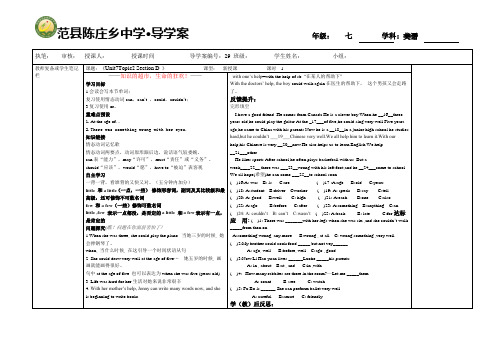
范县陈庄乡中学·导学案年级:七学科:英语执笔:审核:授课人:授课时间导学案编号:29 班级:学生姓名:小组:教师复备或学生笔记栏课题:《Unit7Topic2 Section D》课型:新授课课时 1——知识的超市,生命的狂欢!——学习目标1.会读会写本节单词;复习使用情态动词can,can’t ,could,couldn’t;3复习使用or。
重难点预设1.At the age of…2.There was something wrong with her eyes.知识链接情态动词记忆歌情态动词两要点,动词原形跟后边,说话语气较委婉。
can表“能力”,may“许可”,must“责任”或“义务”。
should“应该”,would“愿”,have to“被迫”表客观自主学习一背一背,看谁背的又快又对。
(五分钟内加分)little 和a little(一点,一些)修饰形容词,副词及其比较级和最高级,还可修饰不可数名词few 和a few(一些)修饰可数名词little ,few 表示一点都没,是否定的a little 和a few表示有一点,是肯定的问题探究(瞧!问题在你面前害怕了)1.When she was three, she could play the piano. 当她三岁的时候, 她会弹钢琴了。
when, 当什么时候, 在这引导一个时间状语从句.2. She could draw very well at the age of five…她五岁的时候, 画画就能画得很好。
句中at the age of five 也可以表达为when she was five (years old)3. Life was hard for her.生活对她来说非常艰辛4. With her mother’s help, Jenny can write many words now, and sheis beginning to write books.with one’s help=with the help of sb. “在某人的帮助下”With the doctors’ help, the boy could walk again在医生的帮助下,这个男孩又会走路了。
最新仁爱版英语七年级下册U6T3SB导学案

Unit 6 Topic3 Section BHow can I get to the library?一、learning aims1. 能够掌握并熟练运用新单词;2.继续学习如何问路和指路,以及“How far.....”的结构3.通过问路和指路,形成互相帮助的意识.二、Lead in:三、Learn the new wordsTask1:Learn new wordsTask2:Check the Words:A:1.直到....为止 2.千米,公里3.应该4.更换:改变5.车站6.人行道7.公共的,公众的8.灯:灯光9.人行横道10.危险B: 1.When the traffic is red,you can't go across the road.2.My school is about two k away from my home.3.There is a p phone on the street corner. We can go there to give Tom a call.4.This pair of shoes are a little small.I need to (更换)a large pair.四、Teaching stepStep1: Listen to 1a and finish 1b.(picture1)Step2: Read after the tapeStep3: Read 1a together.Step4: retell 1a (Act 1a out).Step5: practice 1aStep6: learn picture2in the same wayStep7: Complete the conversations Then listen and check your answers.(finish 2a)Step8:Read 1a again and find out the key points1.去...的路________________2.左转________________3.在你的左边________________4.离..有..远5.换乘________________6.需要做某事________________7.到达________________8.继续走________________五、Do exercisesA: Excuse me,where is the hospital?B: Sorry.I'm new here.You may ask the woman over there.A:__________________________.( The old man goes to the woman)A: Excuse me,_____________________________________C: No,there isn't.But there is one near the Bank of China.A:_____________________________C: About two kilometers.A:_____________________________C: You can take the No.108 bus.It will take you there.A:_____________________________C: You're welcome.六、Summary七、Homework。
- 1、下载文档前请自行甄别文档内容的完整性,平台不提供额外的编辑、内容补充、找答案等附加服务。
- 2、"仅部分预览"的文档,不可在线预览部分如存在完整性等问题,可反馈申请退款(可完整预览的文档不适用该条件!)。
- 3、如文档侵犯您的权益,请联系客服反馈,我们会尽快为您处理(人工客服工作时间:9:00-18:30)。
七年级英语下册全册导学案(仁爱英语)本资料为woRD文档,请点击下载地址下载全文下载地址课题:Unit8TheSeasonsandtheweatherTopic3Let’scelebrate!SectionA(第一课时)备课人:薛静(柳园中学)审核人:班级:学生:【学习目标】.学习节日名称:SpringFestival,christmas,LanternFestival,Thanksgiving,Easter,mid-autumnFestival2.学习并掌握新单词:dumpling,sweet,luck,riddle,pie,believe,full,moon3.谈论中国和其他国家的一些重要节假日及其庆祝方式,了解中外风俗文化的差异。
chinesepeopleeatdumplingsandperformlionanddragondan ces.Peopleinmanycountriescelebratechristmasandgiveeacho therpresents.onLanternFestival,peopleeatsweetdumplingsforgoodluc k.onThanksgiving,manypeopleeatturkeyandpumpkinpie.【知识链接】Twelvemonthsinayear:____________________________________________________________________________________________________________________________Sevendaysinaweek:______________________________________________________what'sthedatetoday?It's_____________.whatdayisittoday?It's_____________.【预习达标】XX9月10日XX2月25日XX1月24日星期四XX2月31日十二月初七XX月23日正月初一XX2月6日正月十五________________________________ ______________A.SpringFestivalB.Teachers’Dayc.christmasD.Newyear’sEveE.ThanksgivingnternFestival【学习流程】自学指导下面这些图片让你想起了哪些节日呢?你能把英文名称写下来吗?___________________________合作探究.认真阅读1a,完成下列表格。
.FestivalDateFoodActivitySpringFestivallunarjanuary1stdumplingschristmasturkeyandchristmascakesgiveeachotherpresentsLanternFestivallunarjanuary15thThanksgivingturkeyandpumpkinfamiliesgettogetherforabigdinnertoeatturkeyandpumpkinpie2.根据表格内容,复述每个节日。
3.完成1b.(四人一组讨论1b中的问题,然后各组派代表汇报。
)展示提升.练习并完成2。
2.Let'splayagame.将全班分成4小组,每组的第一个学生只说一个节日名称,之后的学生必须重复前面的节日名称,并且再说一个新节日的名称,依次类推。
哪一组在最短时间内说全10个节日,该组则为优胜组。
【盘点收获】我今天学到了好多节日名称:_______________________________________________________________________________________________________________________________________________________________________________________________我今天学到的新单词有:______________________________________________________________________________________________________________________________________________【当堂检测,点击中考】根据提示或用所给词的适当形式填空。
.-wouldyoulikeabowlof__________?-No,thanks.I'm________.2.Themooncaketastes_________.3.you’dbetternot_________tricks_____yourfriends!4.________________goesaroundtheearth.5.I______________homeuntilIfinishedmyhomeworklastni ght.教师复备栏/学生笔记栏课题:Unit8TheSeasonsandtheweatherTopic3Let’scelebrate!SectionB(第二课时)备课人:薛静(柳园中学)审核人:班级:学生:【学习目标】.学习并掌握下列单词和词组:important,prepare,church,putup,open,gift,grape 2.谈论圣诞节、新年及其庆祝方式。
ItisonDecember25th.onchristmasEve,thenightofDecember24th,familiesoften gotochurchandsingchristmassongs.3.进一步了解中外风俗文化的差异。
childrenputupstockingsbythefireplacesorattheendofth eirbedsbeforetheygotobed.Somejewishpeopleeatappleswithhoneyforasweetnewyear.【知识链接】what'sthis?whoishe?whataretheydoing?__________________________________________【预习达标】.whatdoyouknowaboutchristmas?2.Doyoulikechristmas?whyorwhynot?【学习流程】自学指导christmasisvery____________inmanywesterncounties.It ison_____________.ThenightofDecember24iscalled_____ ___________.onthenightpeopleoftengoto______andsing_ ________________.childrenputup________atthe________ oftheirbedsbeforetheygotobed.onchristmasDayfamilies haveabig_________andsay,“__________________!"合作探究.读1a,完成下列表格。
TimeActivityBeforechristmasDayonchristmasEveonchristmasDay2.听1a录音,跟读,并圈出短文中的关键词。
3.根据关键词分段复述短文。
important—Dec.25th—preparing—decorate—church—stockings—open—give—get-together—dinner—greetS1:christmasisthemost________festivalinmanycountries.I tison__________…S2:onchristmasEve,familiesoftengoto_______……4.完成1b。
展示提升.仔细阅读1a,完成1b.2.Groupwork.请同学们分组模拟表演圣诞节的生活场景。
各小组互相打分,评出优胜小组。
3.Groupwork。
分组讨论其他国家的圣诞节、新年及其庆祝方式。
【盘点收获】学完本课后,我知道了西方国家的人是这样庆祝圣诞节的:__________________________________________________________________________ _______________________在西班牙人们是这样庆祝新年的:_________________________________________________________________________________________________ ______________________【当堂检测,点击中考】以christmas为题写一篇小短文,或把课文用自己的话复述一遍。
___________________________________________________ ______________________【点评检测结果】教师复备栏/学生笔记栏课题:Unit8TheSeasonsandtheweatherTopic3Let’scelebrate!Sectionc(第三课时)备课人:薛静审核人:班级:学生:【学习目标】.学习并掌握下列单词和词组:start,whole,stayup,knockon/at,shout,trickortreat2.了解春节和万圣节前夕,比较中外节日差异。
Peoplestayupandenjoydumplingsatmidnightforgoodluck.onthefirstdayofthelunarnewyear,childrengreettheirpa rentsandgetluckymoneyfromthem.【知识链接】万圣节(Halloween)万圣节是每年的November1,是欧美的大节日。
Halloween是AllHallowsEve的缩写,意思是“万圣节前夜”,october31晚上。
如同圣诞节一样,万圣节前夜是很热闹的。
每当万圣节到来,孩子们穿上五颜六色的化妆服,带上千奇百怪的面具,提着一盏“jack-o-Lantern”走家串户,像大人们索要礼物。
